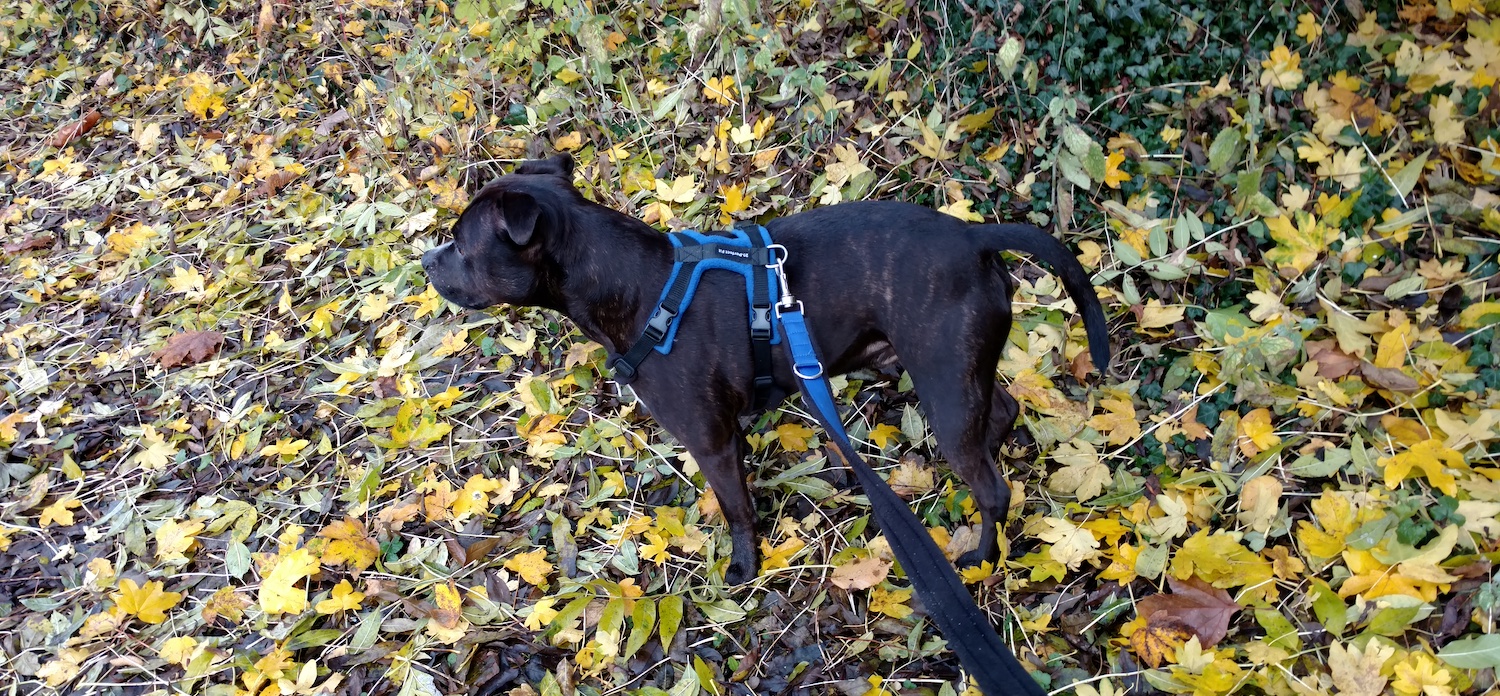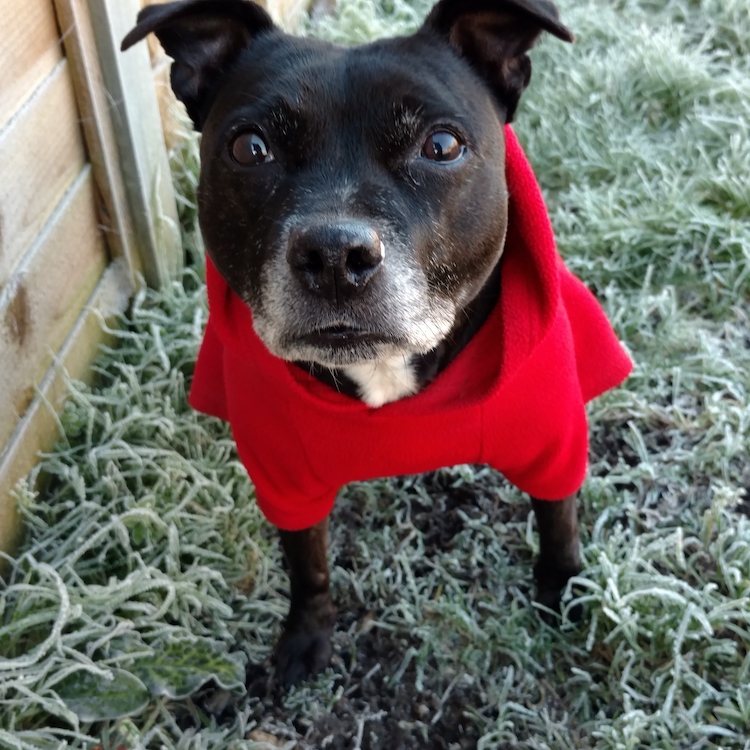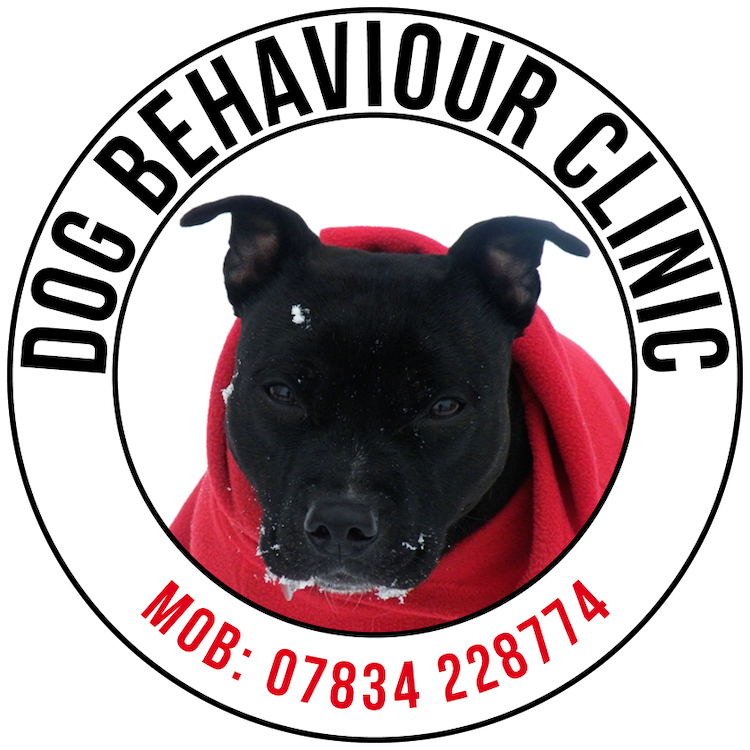
Natural daylight begins to shorten as we move into Autumn and towards Winter. Many of us enjoy the cosy dark nights that come with this and the seasonal celebrations such as Halloween, Guy Fawkes Night and Christmas.
Our dogs may not enjoy these so much and some may already have negative associations with these events through classical conditioning. Dogs often associated darker nights with fireworks.
With the darker nights and shorter days, going for walks with our dogs may prove more problematic. If walking with your dog is only possible early in the morning or during the evenings, make sure you can both be seen by motorists. There are many harnesses, collars and dog coats that are reflective, and it is worth investing in a Hi-Viz jacket for yourself. A small torch is also a great help so you can see where your dog has toileted!
Halloween can be a problem with unexpected visitors at the door. Remember to secure your dog safely behind a door or stairgate to prevent him running out or jumping up at someone.
Fireworks can cause so many problems for dogs, and not just those who are noise sensitive. If you have a puppy or young dog that has not experienced fireworks before, now is the time to start some training to prepare him. It is a little late to start desensitisation and counter conditioning work for this year’s firework season as it can take a long time but do consider contacting a qualified canine behaviourist for help ready for next years fireworks.
For dogs who are already fearful of fireworks, make an appointment with your Vet now to see what help is available.
“If you have a puppy or young dog that has not experienced fireworks before, now is the time to start some training to prepare them”
Some general advice for Firework season:
- Double-check fences, gates, and doors to make sure they are escape-proof
- Ensure you use a stairgate if you need to open the front door during peak times to avoid them bolting out of the door
- Try to walk your dog earlier to avoid walks during expected peak times
- Try to ensure your dog has a sniffy walk before the fireworks start. We know from various studies that sniffing is good for their brains and helps them relax (Duranton & Horowitz, 2018)
- Feed your dog earlier than usual to avoid peak times
- Use enrichment toys or fun games to deliver food
- Accompany your dog into the garden for toileting, even if they are normally fine along, in case any unexpected load bangs occur
- Close curtains and use white noise machines, or some of the dog music tracks now available
- Turn on a TV or radio
- Ensure you have set up a cosy, comfortable, covered den area, close to where the family will be
- Ensure there is always access to fresh water. When dogs are anxious, they pant more frequently

- Use a thunder shirt or TTouch wrap if your dog is happy wearing one
- Plug in Pet Remedy or use the spray on their bedding
- Have chew toys, licky mats or stuffed Kongs ready
- Above all, grab yourself a book and try to stay clam and relaxed yourself! Our dogs are tuned into our emotions (Sundman et.al., 2019)

Dogs love foraging and fallen autumn leaves are a big hit for many dogs, but we must remember some of the potential dangers. For example, conkers and chestnut leaves are poisonous for dogs if chewed and can also cause blockages. Choose your area carefully for treat searches and foraging. Acorns and oak leaves are also poisonous and can cause stomach upset and in very severe cases, kidney failure and death. They can also cause a blockage.
Seasonal Canine Illness is a serious and potentially life-threatening disease that affects dogs in autumn, usually after a walk in a forest or wooded area. The cause of this illness is still unknown although some studies suggest that harvest mites might play a role in this illness as several the dogs who have fallen ill have been found to have mites, (McGarry, 2012).
Symptoms often present as gastroenteritis so if your dog is unwell and you have walked in forest/wooded areas, do have him checked by a Vet to ensure it isn’t Seasonal Canine Illness.
Autumn also sees an increase in the tick and flea population, (Rosatti, 2017).
When Winter arrives, dogs exercise opportunities are often reduced greatly due to icy roads, bad weather and shorter days.
There are lots of enrichment activities for dogs that can be done inside the house or in the garden such as find the treats, interactive food toys and searching games.
Play is important for bonding. If your dog is not keen on playing with other dogs, playing with a human can be just as rewarding, (Payne et. al., 2015). Contrary to belief, tug games are a great way of interacting with dogs and it is fine to “let them win”.
For smaller dogs and hairless breeds, do get them a coat to help keep the cold out. Coats are also useful for our senior dogs who may have arthritis or other painful conditions that are affected by the cold. Keep beds out of draughty areas and try to use orthopaedic ones for senior dogs.
There are several substances that can affect our dogs in Winter. One is the use of antifreeze in our cars. Do check where you are walking for any leaked or spilt antifreeze.
When the icy weather arrives, grit and rock salt used to de-ice pavements can cause burns, pain, and illness. Remember to wash your dogs’ paws after a walk to prevent them ingesting these substances by licking.
Christmas is often a busy time and highly exciting for everyone. Remember to give your dog something fun to play with while you settle visitors and open presents. A stuffed Kong or licky mat can provide stimulation and enjoyment as well as distract your dog from the general hustle and bustle. Look out for items that are poisonous to dogs during this season.
Our Expert
Lisa Hird is a canine behaviourist and joint Principal and course tutor for The International School for Canine Psychology & Behaviour Ltd
The Dog Behaviour Clinic was founded by Lisa Hird, offering a wide range of services to cater for all aspects of canine behaviour and training.
For more information:

